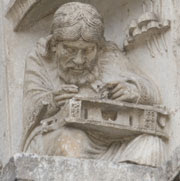Mythbuster I

Nature 452, 816-818 (17 April 2008) doi:10.1038/452816a; Published online 16 April 2008
Triumph of the medieval mind
Philip Ball is a consultant editor for Nature. His new book Universe of Stone: Chartres Cathedral and the Triumph of the Medieval Mind is published next month by Bodley Head.The popular caricature locates the origins of modern science in the natural philosophies of ancient Greece and the rediscovery of their spirit during the Renaissance and the Enlightenment. It passes decorously over the intervening period, deemed to be a hotbed of superstition. In fact, the notion of a Universe governed by laws accessible to human reason — the precondition for science — emerged in Western Europe largely during the twelfth century, several hundred years earlier than we have come to imagine.
(...)
A rationalist position was also nurtured at the cathedral school of Chartres (see 'Rationality in stone'). From around the 1120s, this school acquired several chancellors with a deep interest in natural philosophy. These included Bernard of Chartres and his brother (or possibly pupil) Thierry, arguably one of the true founders of Western science. The Chartres scholars were platonists: they believed that the mundane world is underpinned by a transcendental realm governed by order and geometry. Thierry attempted to show how platonic 'physics' could be used to comprehend the world systematically, and even to interpret the biblical creation in Genesis.
Another Chartres scholar and teacher, William of Conches, got into trouble for pushing the rational agenda even harder. His Philosophia Mundi provided twelfth-century Europe with its first comprehensive treatise on the physical world. He argued that natural phenomena arise from forces that, although created by God, act under their own agency. William insisted, echoing Plato, that the divine system of nature is coherent and consistent, and therefore comprehensible: if we ask questions of nature, we can expect to get answers, and to be able to understand them.(...)
The twelfth-century trust in reason and interest in nature for its own sake flourished in the following century. This was particularly so in the aristotelianism of Thomas Aquinas, Robert Grosseteste and Roger Bacon. Their emphasis on attention to detail and careful observation signals the beginnings of an experimental approach — something that was unlikely to emerge from the abstract platonism of Chartres. Crudely speaking, Plato focused on the generalities, Aristotle on the particulars.
The backlash begins
But the golden age of rationalism in the early thirteenth century instigated a theological backlash, a kind of medieval Counter-Reformation. This culminated in the papal declaration of 1277 condemning many propositions in Aristotle's works. It was a metaphysical power struggle: was the world ruled by God's whims or Aristotle's laws? Could God contradict Aristotle? The battle was also more prosaic: did the universities' theology faculties have more authority than the arts faculties?
Comentários